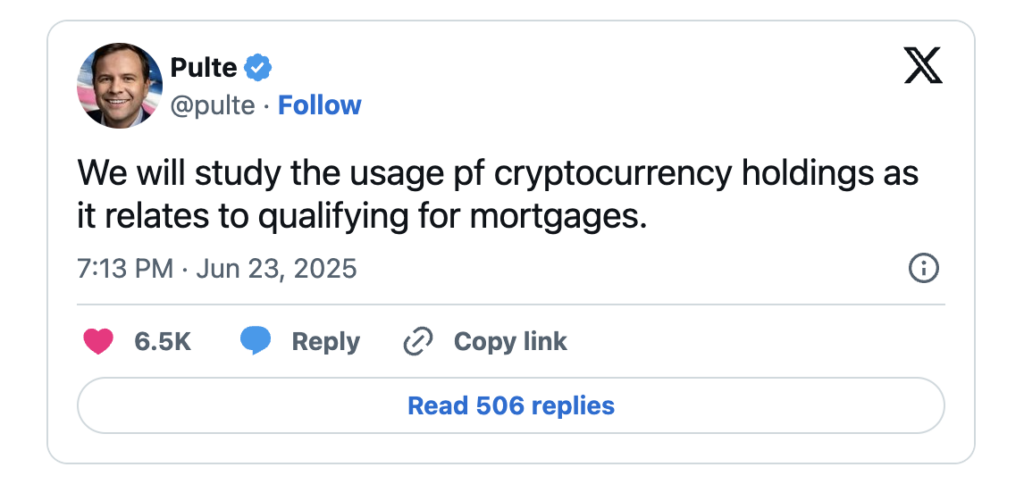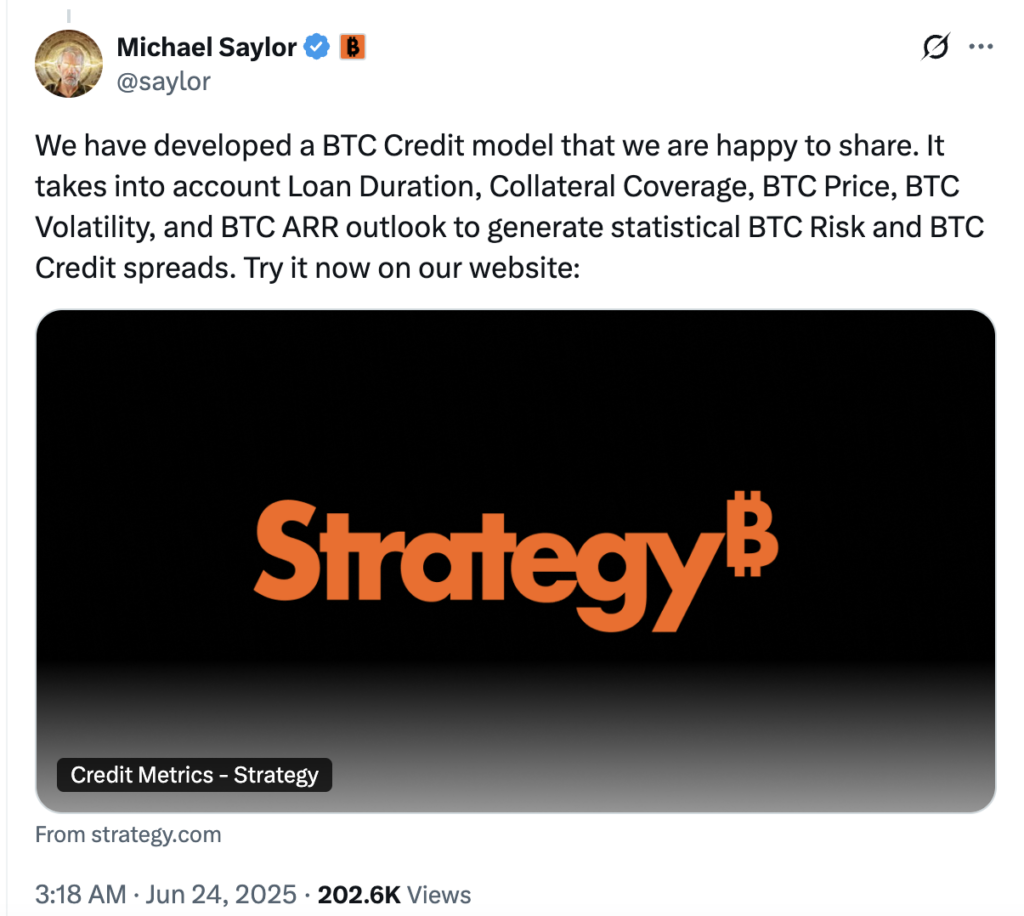In the American mortgage market, cryptocurrency may someday be just as important as cash. Today, Bill Pulte, Director of the U.S. Federal Housing Finance Agency (FHFA), announced a ground-breaking initiative: the agency will investigate how cryptocurrency holdings affect mortgage eligibility.
Pulte’s remark corresponds with the U.S.’ growing embrace of cryptocurrency under President Trump. Pulte was sworn in on March 14 following Trump’s nomination. According to public records, he holds up to $1 million in bitcoin and Solana’s SOL ^145.29. He also has investments in MARA Holdings, a cryptocurrency company, air conditioning companies, MrBeast Industries, and Elon Musk’s X, among other companies.
For cryptocurrency assets to be taken into consideration, Fannie Mae and Freddie Mac now stipulate that they must be “exchanged into U.S. dollars and is held in a U.S. or state regulated financial institution.”

In what might be a revolutionary change in U.S. housing financing, the FHFA is investigating whether cryptocurrency holdings could be taken into account when evaluating mortgage eligibility. The Federal Home Loan Administration (FHFA), which is in charge of Fannie Mae, Freddie Mac, and the Federal Home Loan Banks (FHLB), is evaluating how cryptocurrency fits into the larger picture of borrower assets and may include it in the underwriting toolset that already consists of traditional savings, income, and credit ratings.
Key Findings:
- The FHFA is investigating if cryptocurrency assets can be used to qualify for a mortgage.
- If accepted, cryptocurrency might be used in loan applications alongside more conventional assets like cash and equities.
- The action would signal a significant change in U.S. housing policy with regard to digital assets.
- According to its director, the FHFA began reviewing digital asset balances in home loan applications.
- This might alter the way Freddie Mac and Fannie Mae assess borrower wealth to take bitcoin holdings into account.
The idea has generated a lot of attention and discussion among professionals, cryptocurrency fans, and politicians, even though it has the potential to change the home finance market. Michael Saylor, the CEO of Strategy (MicroStrategy), responded to Pulte’s X post by offering the company’s BTC Credit model as a means of facilitating this change. This well-known methodology calculates Bitcoin’s rating, risk, and credit by taking into account factors including volatility, collateral coverage, and loan term.

“We have developed a BTC Credit model that we are happy to share. It takes into account Loan Duration, Collateral Coverage, BTC Price, BTC Volatility, and BTC ARR outlook to generate statistical BTC Risk and BTC Credit spreads. Try it now on our website:,” Saylor said in his X post.
Another commenter pointed out that under federal lending laws, cryptocurrency holdings must already be recognized as valid collateral under the Digital Asset Market Clarity Act of 2025 (H.R. 3633). It does, however, forbid discrimination against digital commodities in the underwriting of mortgages.
“While innovation is critical, the real risk lies in D.C. bureaucrats layering redundant “risk assessments” that duplicate existing fraud safeguards,” noted the user, adding “the market’s adapting faster than regulators—let’s streamline, not suffocate progress with more studies.”
Critics alert the Director to the possibility of a housing bubble similar to the one that occurred in 2008, when the exposure of Fannie Mae and Freddie Mac to subprime loans required a government rescue. The historical comparison encourages caution because there is currently no peer-reviewed research to substantiate this anxiety with crypto-backed mortgages.
Implementing Crypto Mortgage Apps & The “Three C’s”
According to Pulte, the agency is currently investigating the possibility of incorporating cryptocurrency into mortgage applications, namely as a component of the asset evaluation procedure.
The “three C’s”—Credit, Capacity, and Collateral—are traditionally taken into account by underwriters.
Financial strength is demonstrated by assets like cash, equities, and retirement accounts; however, cryptocurrency has mostly been left out because of its volatility and lack of clarity on regulations. Now, in today’s markets, that could shift significantly.
Candidates with substantial digital holdings may benefit from adding cryptocurrency as a “fourth C,” particularly if they don’t want to unload before closing on a property.
The official recognition of cryptocurrency holdings, particularly Bitcoin or stablecoins, as qualified assets might provide access to traditional lending for millions of Americans who have amassed riches through digital means. Lenders frequently demand that assets be converted into fiat and “seasoned” in a bank account for months before they may be considered, even if a borrower has a sizable cryptocurrency holdings.
It might be time to update that policy, according to Prashant Jha, a Crypto Journalist based in Delhi, India.
The FHFA might assist in updating mortgage guidelines to reflect a shifting financial landscape and increase credit availability for borrowers who are digital natives by treating cryptocurrencies similarly to other liquid assets. The FHFA’s eventual approval of crypto-backed mortgage eligibility would represent a significant reversal of years of institutional prudence.
Until recently, traditional lenders were concerned about just dealing with cryptocurrency holders. Crypto is now getting closer to being considered like any other asset class as regulatory momentum grows and digital assets become more widely accepted.
However, one thing remains certain: Crypto is no longer being disregarded at the top echelons of American banking, regardless of whether this opens the floodgates or just pushes the system forward. With continual economic shifts and uncertainty surrounding the future of the U.S. housing market, maybe this will allow more potential homebuyers—especially first-timers—more opportunities to qualify for a mortgage, inching closer toward the American Dream.






